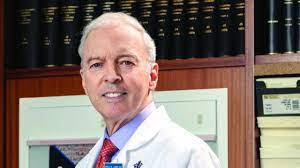
Landry has focused on novel approaches to intractable health problems, combining medicine and organic chemistry. His work on cocaine addiction led to the discovery of an artificial enzyme to degrade cocaine. His report on the enzyme, published in Science, was chosen by the American Chemical Society as one of the 25 most important chemistry papers in the world for 1993. An agent (Cocaine esterase) he co-developed to treat cocaine overdose has entered clinical trials from Tonix Pharmaceuticals.[17][18][19] He founded the Columbia Organic Chemistry Collaborative Center and it is through this Center that he conducts his current work on drug discovery.
Landry discovered a new hormone deficiency syndrome: vasopressin deficiency in vasodilatory shock. In pioneering the use of vasopressin to treat septic shock and vasodilatory shock after cardiopulmonary bypass, he changed clinical practice for these life-threatening conditions. He also founded ICU nephrology at Columbia, introducing continuous renal replacement therapy to treat renal failure in patients with shock.
Landry developed an alternative method for the production of human embryonic stem cells that relies on harvesting live, normal cells from embryos that—by objective, peer-reviewed criteria—have died of natural causes. Cells harvested from dead embryos would be covered under the established ethics governing transplantation of essential organs from deceased donors.







